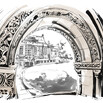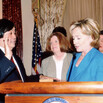MFIA Clinic Seeks Records in Pentagon Papers Case
Acting on behalf of Harvard historian and author Jill Lepore, the Media Freedom & Information Access Clinic has petitioned the United States District Court for the District of Massachusetts to unseal the records of two 1971 Boston grand juries convened to investigate the leak and publication of the Pentagon Papers. Despite the legendary status of the Pentagon Papers, and the numerous articles, books and films that have addressed the episode, the Boston grand jury records have remained hidden from public view for nearly half a century. On December 19, 2018, Professor Lepore asked the District Court to exercise its inherent power to make these historically significant records available to the public.
In 1971, Daniel Ellsberg ignited a political and legal firestorm when he provided a secret study chronicling the United States’ disastrous involvement in Vietnam to the New York Times, the Washington Post, and other publications. The Pentagon Papers exposed decades of futility and deception in the U.S. government’s prosecution of the war, and the government responded by investigating Ellsberg and those it suspected of helping him copy and distribute the Papers, according to the clinic. Ellsberg’s legal battles in California (where he had worked for the RAND Corporation), and the Supreme Court fight over the Nixon Administration’s attempt to block the Times and the Post from publishing the Papers, are well-documented. But the purpose and proceedings of the Boston grand jury remain shrouded in secrecy, the clinic said.
Professor Lepore, a staff writer for the New Yorker, learned of the Boston grand juries while conducting research for a forthcoming book. When she asked the National Archives at Boston for access to the records, she learned that only the District Court could order their release. As Professor Lepore notes in the declaration she submitted to the Court, the Boston investigation’s focus on researchers and scholars — including Samuel Popkin, who was imprisoned for eight days for refusing to reveal his sources — make these proceedings a “landmark in the history of the federal government's willingness to investigate and prosecute dissidents, scholars, journalists, and anyone else suspected of involvement with the release and publication of classified government material.”
The people caught up in the investigation — including those who were called before the grand jury — overwhelmingly support Professor Lepore’s petition. Ellsberg, Popkin, MIT professor and anti-war activist Noam Chomsky, former United States Senator Mike Gravel, and others have submitted declarations explaining the historical significance of the proceedings and expressing support for the release of the records.
Clinical lecturers Charles Crain and John Langford ’14, and students Jessica Baker ’20 and Ellis Liang ’19 are working on this matter. They are assisted by Jonathan M. Albano and Noah J. Kaufman of Morgan Lewis’ Boston office.
The Yale Law School Media Freedom and Information Access Clinic is a legal services clinic dedicated to increasing government transparency, defending the essential work of news gatherers, and protecting freedom of expression through impact litigation, direct legal services, and policy work. The clinic is an initiative of the Information Society Project at Yale Law School and is funded by the Floyd Abrams Institute for Freedom of Expression.


